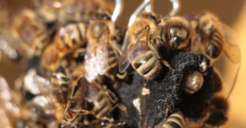Neurobiology of collective defence in honeybees

Honeybees defend their nest against large predators thanks to a collective effort to harass and sting the intruder. The stinger apparatus has evolved to detach upon stinging elastic skin (such as ours) to maximize venom delivery, but the drawback is that the mutilated bee then dies within a few hours. Thus, the colony under threat must achieve a delicate balance: enough bees need to respond that the intruder is successfully deterred, but without unnecessarily depleting the colony of its workforce. The aim of this project is to understand how this balance is reached. In particular, it focuses on how each individual bee takes the decision to attack or not, depending on the social information that it receives. An important part of this social information is the alarm pheromone that bees use to communicate the presence of a danger, but we suspect that more subtle cues may also be involved. We aim to identify and characterize this social regulation using an integrative approach, ranging from behavioural experiments and modelling to neuroanatomy and pharmacology.
The position to be filled is in the department of Biology at the University of Konstanz, Germany. The University of Konstanz is a leading institution for research, and is one of the 11 Universities of Excellence in Germany. It is located on the shore of Lake Konstanz, in between the Alps and the Black Forest. The team (https://www.social-neuroethology.com/) is hosted within the lab of Pr. Galizia (https://neuro.uni-konstanz.de/), which has extensive expertise on insect neurobiology, especially olfaction.
The position is fully funded for 3 years. The project is broad and we expect the student to focus on part of it based on his/her main interests, hence we welcome students from a diversity of background including biology, physics and computer science. Previous experience in neurobiology, invertebrate behaviour/physiology or video-tracking analysis would be advantageous. Fluency in English is mandatory, German is not required. We particularly encourage candidates with a streak of independence, and we will support initiatives to develop the project into new directions.
Please apply online via the IMPRS website. For further information you can contact: Morgane Nouvian morgane.nouvian@uni-konstanz.de.
Keywords: honeybees, defence, neuroethology, collective behaviour, neuromodulation
